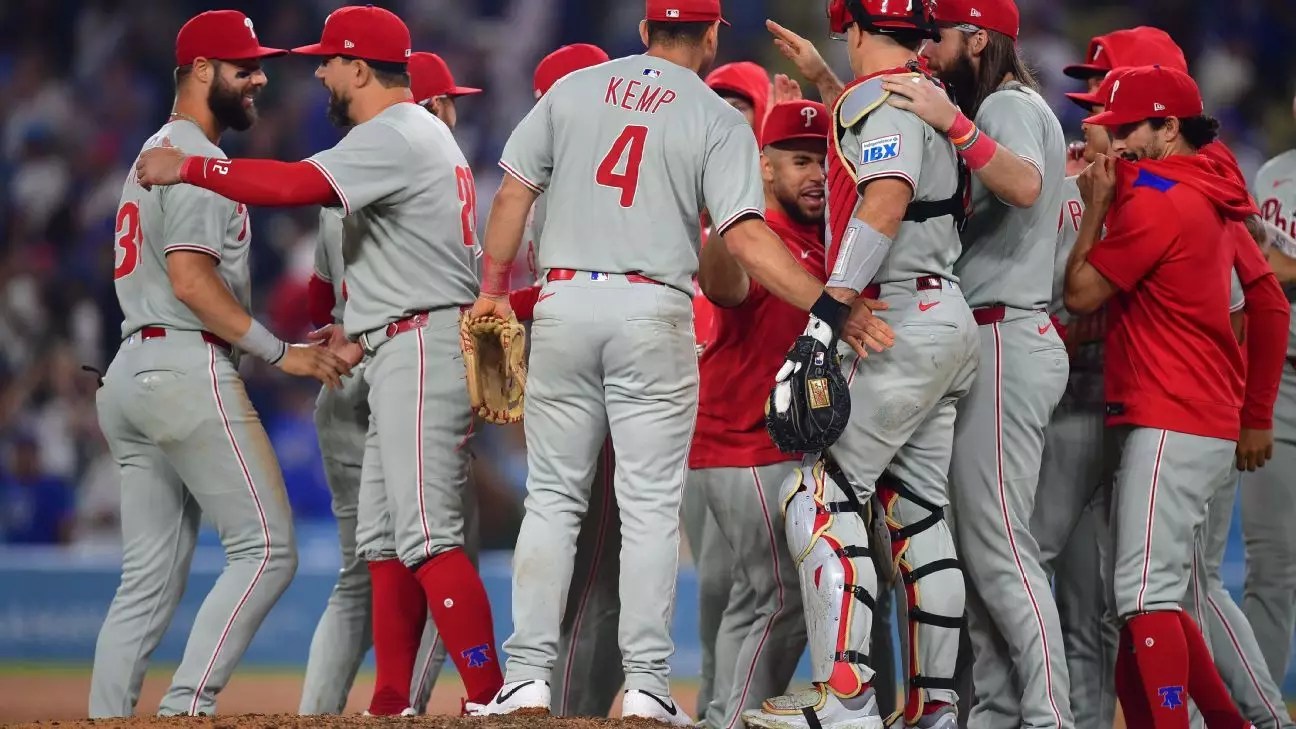Celebrations in professional sports often evoke images of exuberance, but rarely do they reveal the deeper truths about a team’s character. The Philly Phillies’ recent victory is far more than a spirited party after a win; it exemplifies a resilient mindset that challenges conventional narratives about success. With Bryce Harper pouring champagne over his head and Kyle Schwarber chugging beer through a hose, these moments reflect the team’s unyielding belief that perseverance fuels achievement. Such displays are not mere antics—they are outward symbols of an inner resolve that refuses to accept mediocrity.
This team understands that victory is not accidental but cultivated through relentless effort amid adversity. Their willingness to celebrate passionately—despite setbacks like blown leads—carries an implicit message: resilience is not just about bouncing back but about transforming setbacks into fuel for future successes. Their culture promotes joy rooted in perseverance, asserting that true champions savor moments of triumph as proof of their unwavering commitment to overcome every hurdle.
Challenging the Narrative of Complacency in Baseball
The Phillies’ recent triumph upends the idea that baseball, with its unpredictable nature, fosters complacency. On the contrary, this team exemplifies strategic adaptability and mental toughness. They navigated a season riddled with injuries—losing their ace Zack Wheeler, a powerhouse with a 2.71 ERA, yet still managing to clinch their division two days earlier than their 2011 peak.
Their ability to survive setbacks underscores a vital leadership lesson: resilience is rooted in a proactive attitude that refuses to be defeated by circumstances. The players’ “next-man-up” mentality is a powerful counterpoint to narratives that portray baseball as a game of individual brilliance alone. This team demonstrates that collective resilience, adaptability, and a relentless pursuit of excellence forge a path to victory—even when the odds appear stacked against them.
Furthermore, the Phillies’ strategic approach—balancing slugging power with small-ball tactics—reveals an evolving understanding of the game. They challenge the misconception that modern baseball relies solely on big hits; instead, they showcase versatility that keeps opponents guessing and typifies a thoughtful, balanced style of play that is more aligned with contemporary expectations of the sport’s future.
Leadership and Firm Foundations in an Uncertain Era
Behind the scenes, the Phillies’ success stems from strategic leadership that recognizes the importance of stability and adaptability. Manager Rob Thomson’s remarkable achievement—earning consecutive division titles in his first four full seasons—is not just a personal milestone but a testament to forward-thinking management in a sport often characterized by volatility.
Thomson’s ability to keep a fractured roster cohesive, despite injuries to key players like Trea Turner and Alec Bohm, illustrates the power of leadership rooted in resilience and trust. His acknowledgment that his team is “a little bit different than we have been in the past” illustrates a nuanced understanding of change; instead of fearing setbacks, he leverages them as opportunities for growth.
The Phillies’ approach resonates with core liberal values: investment in human capital, adaptability in the face of adversity, and the importance of inclusive teamwork. Their continuity and resilience prove that success is not merely about minimizing failures but embracing them as integral to a larger, sustained effort to redefine what a winning team looks like. It challenges a traditional sports narrative that often celebrates heroism over collective perseverance, instead highlighting the virtue of collective grit in overcoming obstacles.
The Myth of the Instant Win and the Power of Patient Progress
In an age where instant gratification often dominates, the Phillies remind us that real achievement requires patience, strategy, and persistent effort. Their victory, coming in a game that had seen multiple one-run leads exchanged, underscores the importance of mental endurance and calculated patience. Their ability to rally after setbacks—hitting crucial homers in the seventh inning against defending champions, for example—exemplifies a mindset that refuses to fold under pressure.
This resilience speaks to a broader societal truth—that sustainable success is rarely immediate, but the product of sustained effort, strategic adjustments, and a refusal to accept defeat. Their season trajectory exemplifies this: a team that suffered setbacks but refused to accept them as final, instead viewing each challenge as an opportunity to evolve.
The Phillies’ narrative pushes back against the seductive allure of shortcuts and quick fixes prevalent in modern culture. Their accomplishments demonstrate that meaningful progress demands perseverance, strategic patience, and a collective belief in growth through adversity. They embody an optimistic vision that resilience—more than raw talent or momentary luck—is the true foundation of enduring success.
The Philadelphia Phillies’ recent triumph is more than a division title—it is a declaration of resilience, adaptability, and collective grit. Their journey underscores a fundamental truth: that sustainable success doesn’t arise from fleeting moments of brilliance but from an unwavering commitment to overcome setbacks and redefine limits. Their story challenges us to rethink how we value persistence and mental toughness in a world quick to dismiss setbacks as failures. This team’s resilience exemplifies the progressive belief that in both sports and society, true victory belongs not just to those who win but to those who persist relentlessly against all odds.

